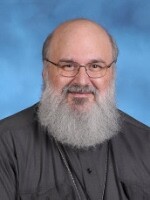Jesus said, “Come to me, all you who are weary and find life a burden, and I will give you rest.”
There are few things in the life of gay people that is more of a burden than fear. Fear seems to go hand in cold, lifeless hand with the epiphany that you are sexually and emotionally attracted to a member of the same gender. Fear of what it means to be a minority that strikes fear and hatred in the hearts of so many, fear of your secret being found out, fear of the reaction of family, friends and church. Fear cripples, it warps our vision of ourselves and of our world, and, perhaps most insidious of all, fear can poison how we believe the God who created us now sees us. Fear makes us question whether or not we are even loved by God, it makes us doubt our own goodness and worthiness to live. No wonder the phrase that most often crosses Jesus’ lips, in one form or another, is “Do not be afraid.”
When I was 16 (and I do not believe my story is essentially all that different from the story of my gay and lesbian sisters and brothers), and had my first sexual experiences, there was a strange mixture of excitement and fear. The physical sensations of tenderness and release were wonderful to be sure. But with those feelings I now acquired a label, or labels, for the feelings of a lifetime. I was “gay”, “queer”. I was a “fag”, a “faggot”. I was one of “them”. And there was something far worse for a Catholic kid for whom religious faith was the center of his life. Because of the limited, non-technical literature available to teens in the early ’70s, coupled with the fear-inducing rantings of the T.V. preachers, I came to believe I possessed one more label: “abomination”. I nauseated God, angered my Creator by my feelings and desires. Worse still, because of all that was told to me, I had to resign myself to the “fact” that the Jesus, whom I considered not only my Savior but also my best friend, was now repulsed by me. This meant that I could no longer receive the eucharist with the same ease and familiarity and joy as I once did, since it would be sacraligious to take the body, blood, soul and divinity of Jesus Christ and have it mingle with the sin-soaked flesh and blood of a faggot. So I stayed away, going to church every week as usual, but staying far from the one person I so despirately needed.
But, mercifully, God has a profoundly warped sense of humor! One evening I turned to, of all things, “The 700 Club”, where two “reformed” gay men gushed over how Jesus had set them free from the gay lifestyle (so many years later I have yet to find out why straight people have lives, but gay folk have life “styles”!). After their testimony, Pat Robertson said that Jesus could do the same thing for anyone who wanted to find freedom.
Here was my chance to find a way back to being Jesus’ friend again and rid myself of the fear that kept me from his side. So, I knelt before the T.V. and begged God to remove my gayness and make me his friend once more. Suddenly I felt a gentle warmth begin, from the crown of my head, to course throughout my body, and with it such a sense of release that I began to weep and laugh. I was set free, not from being gay (God does not free someone from a gift he has graciously bestowed), but from the fear and loathing that had burdened me and kept me from him who had never left me and who never felt anything for me but love and mercy and compassion.
On the one hand, I wish that moment years ago meant an end to the fear I have battled. But it has been a constant struggle with a foe who is continually nourished by the ignorance and fear of church and society. Yet as each new battle has been engaged, Jesus has reminded me of the need to trust in him alone, that in him is my rest and my strength. In the safety of his embrace, I have nothing to fear. Nestled close to his heart, I have nothing to fear. With my trembling hand securely in his nail-scarred grasp, I have nothing to fear. I know this to be true for me. And as surely as I am breathing now, I know it is true for all my gay brothers and sisters.

Tom Yeshua is the pen name of Thomas E.L. Cloutier OFS, a transitional deacon who taught theology for 30 years at Nashua (N.H.) Catholic Regional Junior High School. He earned a bachelor’s degree from Don Bosco College in Newton, N.J., and a master’s in divinity and theology from St. John’s Seminary in Brighton, Mass.
